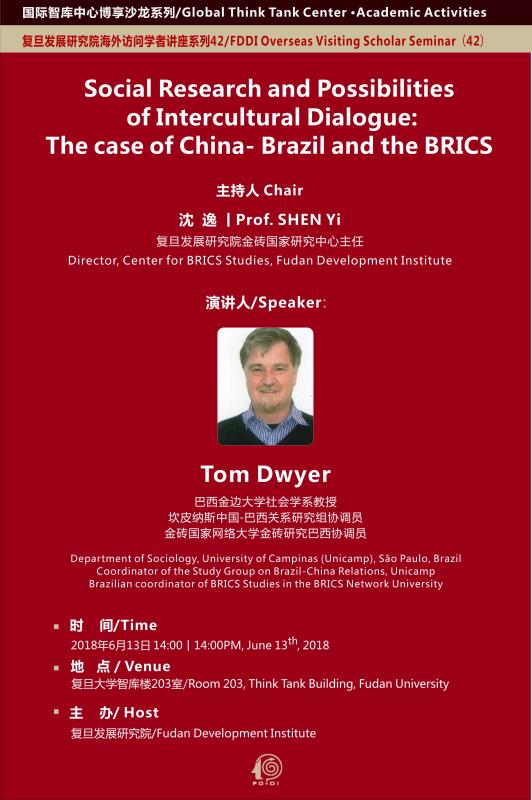作者: 发布时间:2018-06-12 13:54:08来源:+收藏本文
国际智库中心博享沙龙系列
Global Think Tank Center ·Academic Activities
bet36365体育在线live海外访问学者讲座系列42
FDDI Overseas Visiting Scholar Seminar(42)
Social Research and Possibilities of Intercultural Dialogue:
The case of China- Brazil and the BRICS

主持人Chair
沈 逸 丨Prof. SHEN Yi
bet36365体育在线live金砖国家研究中心主任
Director, Center for BRICS Studies, Fudan Development Institute
演讲人Speaker

Tom Dwyer
巴西金边大学社会学系教授
坎皮纳斯中国-巴西关系研究组协调员
金砖国家网络大学金砖研究巴西协调员
Department of Sociology, University of Campinas (Unicamp), S?o Paulo, Brazil
Coordinator of the Study Group on Brazil-China Relations, Unicamp
Brazilian coordinator of BRICS Studies in the BRICS Network University
时间Time
2018年6月13日 14:00丨14:00 PM, June 13th, 2018
地点Venue
复旦大学智库楼203室丨Room 203, Think Tank Building, Fudan University
主办Host
bet36365体育在线live 丨Fudan Development Institute
摘要Abstract
The forces of economic globalization have brought a number of surprising changes for Brazil’s role in the World, among these, China has become our major trading partner. This has made it necessary for citizens of each country to get to know the other better, knowledge is a pre-requisite to deepen the grounds for cooperation on the one hand and to avoid that unresolvable differences lead to a ‘clash of civilizations’ (Huntington) on the other hand.
From 2009 the concept BRICS emerged to build a political entity, through which Brazil, Russia, India, China and South Africa agreed to cooperate in order to strengthen exchanges and cooperate to transform the structures of financial power seen as dominated by the West. In the West this grouping is readily dismissed as being an anti-Western grouping.
This paper will employ comparative survey data (World Values Study and PEW) and discuss a number of general issues around the BRICS. After clarification of the paper will move to deepen understanding around several important issues by employing data drawn from the first-ever piece of Sino-Brazilian social science research, a survey which examined values, horizons and lifestyles of young Chinese and Brazilian undergraduate students in six universities in each country. (Dwyer et ali. 2016)
The survey data shows a surprising confluence of values between students in both countries, and data reveals some grounds for building mutual understanding and projects. Also common fears are found amongst students.
It is suggested that the BRICS Network university can provide a fruitful point of dialogue and to build mutual understanding between our countries.